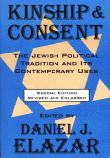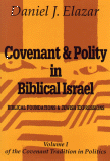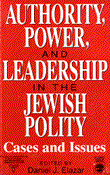Featuring -
Kinship and Consent: The Jewish Political Tradition and Its Contemporary Uses
The exploration of the Jewish political tradition is predicated on the recognition of the Jews as a separate people, not merely a religion or a set of moral principles growing out of a religion. The exploration of the Jewish political tradition, then, is an exploration of how the Jews as a people managed to maintain their polity over centuries of independence, exile and dispersion, and how they animated that polity by communicating their own expressions of political culture and modes of political behavior.
|  |
 |
Covenant and Polity in Biblical Israel: Biblical Foundations and Jewish Expressions
The covenants of the Bible are the founding covenants of Western civilization. They have their beginnings in the need to establish clear and binding relationships between God and humans and among humans, relationships which must be understood as being political far more than theological in character, designed to establish lines of authority, distributions of power, bodies politic, and systems of law.
|
Authority, Power and Leadership in the Jewish Polity: Cases and Issues
Many Jews are finding that they express themselves Jewishly through political means, if at all, whether that entails support of Israel or other causes which then become "Jewish" causes, or through working within the political and communal organizations of the Jewish people, which increasingly are perceived for what they are, namely, means of organizing power.
|  |
 |
Morality and Power: Contemporary Jewish Views
In September 1988, as the intifada approached the end of its first year, we invited a distinguished group of leaders in academic and public affairs in Israel and the diaspora to participate in a symposium on the problems of relating morality and power in contemporary statecraft.
|
|

